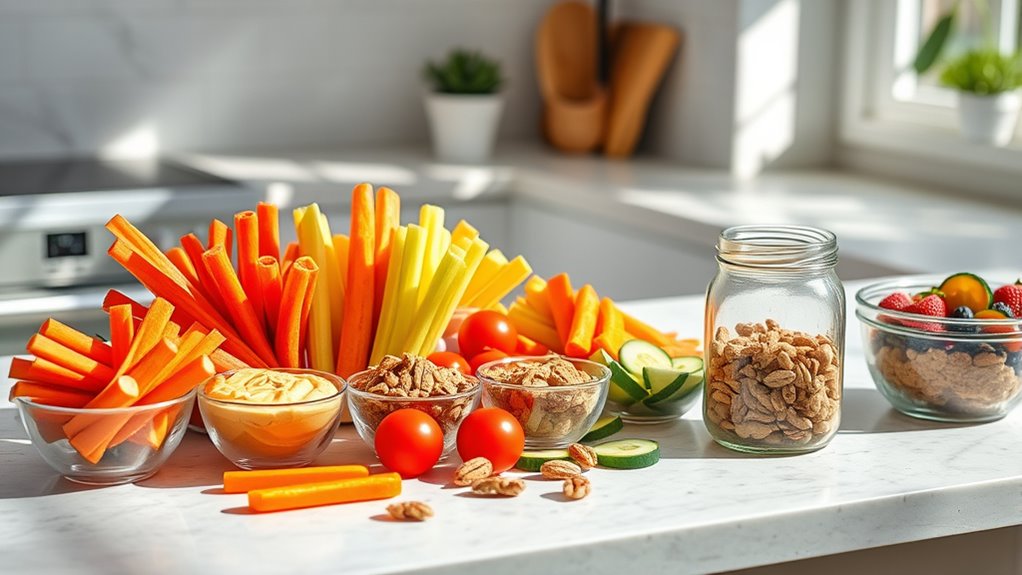To establish healthy snacking routines, plan and prepare nutritious snacks in advance to make better choices easier. Focus on portion control by pre-portioning snacks, and swap processed foods for fresh fruits, veggies, nuts, or whole grains. Keep snacks visually appealing to boost motivation and variety to maintain your routine. Staying consistent with these habits will help you sustain energy, curb cravings, and improve your overall health. Continue to explore these tips to deepen your healthy snacking skills.
Key Takeaways
- Plan and prepare nutritious snacks in advance to ensure healthy choices throughout the day.
- Incorporate wholesome options like fruits, nuts, and vegetables to improve nutrient intake.
- Practice portion control by pre-portioning snacks to avoid overeating and promote moderation.
- Choose visually appealing, colorful snacks to increase motivation and satisfaction.
- Swap processed snack foods for nutrient-dense alternatives to support long-term health goals.

Snacking can be a vital part of maintaining energy and focus throughout your day, but choosing healthy options makes all the difference. When you plan your snacks ahead of time, it’s easier to avoid impulse choices that are high in sugar, salt, or unhealthy fats. Meal prep isn’t just for your main meals; it’s a smart strategy for your snacks too. Dedicate some time during the week to prepare portioned containers filled with nutritious options like cut-up vegetables, nuts, or whole-grain crackers. This way, when hunger strikes between meals, you have readily available, wholesome snacks that satisfy your cravings without derailing your health goals.
Snack swaps are another effective way to keep your routines on track. Instead of reaching for a bag of chips or a candy bar, opt for nutrient-dense alternatives that give you energy and keep you full longer. For example, swap processed snack foods for fresh fruit paired with a handful of almonds or Greek yogurt topped with berries. These swaps don’t just improve your diet; they also help you develop healthier habits without feeling deprived. Over time, these small changes can make a big difference in how you feel and perform throughout the day.
Incorporating mindful planning into your snacking routine also means paying attention to portion sizes. Even healthy snacks can add up if you’re not careful. Pre-portioning your snacks helps you avoid overeating and keeps your calorie intake in check. Use small containers or snack-sized bags to control your portions and prevent mindless munching. This approach encourages moderation and makes it easier to stick to your healthy habits, especially when you’re busy or on the go. Additionally, choosing snacks with high color accuracy can make your food look more appealing, motivating healthier choices.
Frequently Asked Questions
How Can I Resist Unhealthy Snack Cravings Effectively?
To resist unhealthy snack cravings, practice mindful eating by paying close attention to what your body truly needs. When cravings hit, take a moment to assess if you’re genuinely hungry or just bored. Use craving management techniques like drinking water or choosing healthier alternatives. Distract yourself with an activity, and remind yourself of your health goals. Over time, these strategies help you curb cravings and make better snack choices.
What Are Some Quick Healthy Snacks for Busy Mornings?
Think of your morning as a race, and quick healthy snacks are your turbo boost. You can grab pre-portioned nuts or fruit slices, which are perfect for busy mornings. Meal prep ideas like overnight oats or yogurt parfaits save time, while snack storage tips guarantee your snacks stay fresh. Keep them in portable containers, so you’re always ready to fuel up quickly and avoid less healthy options.
How Do Portion Sizes Impact Healthy Snacking?
Portion sizes play a vital role in healthy snacking because they help you practice portion control, preventing overeating. When you choose appropriate portion sizes, you can enjoy snacks without guilt or excess calories. Smaller portions keep your energy levels stable and support your health goals. By paying attention to portion control, you guarantee your snacks contribute positively to your diet instead of sabotaging it.
Are There Snacks Suitable for Specific Dietary Restrictions?
Yes, there are snacks suitable for specific dietary restrictions. You can choose gluten-free options like rice cakes or seed crackers, ensuring they meet your needs. Vegan snack ideas include nuts, fresh fruit, or veggie sticks with hummus. Always read labels to avoid hidden ingredients, and explore specialty stores or online shops for a wider variety. With a little planning, you can enjoy tasty snacks that align perfectly with your dietary restrictions.
How Often Should I Snack to Maintain Energy Levels?
You should snack every 2-3 hours to keep your energy levels soaring like a rocket. Focus on meal timing and nutrient balance to avoid crashing later. Opt for healthy options that combine protein, fiber, and healthy fats, fueling your body without overloading it. Regular snacking helps maintain steady blood sugar, prevents overeating at meals, and keeps your energy consistent throughout the day.
Conclusion
By adopting healthy snacking routines, you can boost your energy and maintain better overall health. Remember, about 60% of people snack daily, often choosing less nutritious options. Making smarter choices, like fruits or nuts, can help you stay on track without feeling deprived. Small changes in your snack habits can lead to significant benefits over time. So next time you snack, choose wisely—you’re shaping your health one bite at a time.










